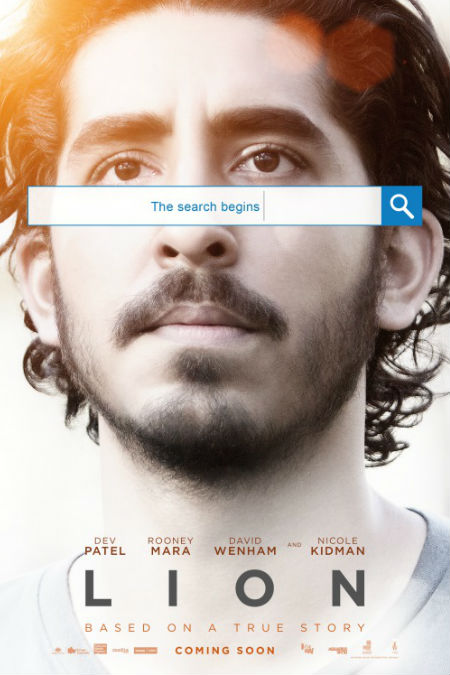
As anyone who has emerged into the full bloom of adulthood with a modicum of self-awareness will acknowledge, the past always informs the present.
For most of us this takes place in small but important ways – a nostalgic preference for a particular holiday place, meal or cultural activity, or more importantly in the way that our personality and approach to life manifests itself; but for adoptees like Saroo (Dev Patel) it is a vast unexplored and often unknowable country, a place so remote from the present everyday that it may as well be on Mars.
And yet for all its unknowingness, that past never stops making itself felt, never not needing to be found, explored, understood and made a part of the world as it is currently inhabited and informed.
No matter how happy growing up might have been or how loved the present might be – in both cases Saroo, adopted from a Kolkata orphanage by John and Sue Brierley (David Wenham and Nicole Kidman), is deeply appreciative and thankful for the “privileged” life he experienced in Hobart, Tasmania – there is an ache, a sense of loss for what was taken away.
Despite growing up happy and healthy, the apple of his parents’ eye – unlike troubled adoptive brother Mantosh (Divian Lanwa) who never adjusts to his new reality as a young boy – Saroo can’t stop thinking about his older brother Guddu (Abishek Bharate), with whom he enjoys close, affectionate ties, and his mother Kamla (Priyanka Bose), who have been left behind in their village of Khadwa in western India wondering where their confident, self-possessed younger family member has gone.
As the brother of two adopted siblings, one from Vietnam and one from South Korea, I can well understand what drives the Brierleys, who are capable of having children but chose not to so they can help two kids in desperate need, to adopt Saroo, but moreover, what impels their adopted son to go on a vast detective hunt to find his sorely-missed birth family.
And it is an epic and near-impossible quest, with Saroo, who falls asleep on an empty train one night when he and Guddu are scavenging for goods with which to support their poverty-stricken family, arriving in Kolkata after a 1600km trip across the country.
Complicating things still further, the vulnerable but resourceful five year old has mangled the name of this home town, making it impossible for anyone in authority to locate where he is from and to return him to his mother who never stops believing that her long lost son will be returned to her.
Screenwriter Luke Davies, who naturally draws heavily from A Long Way Home by Saroo Brierley and Larry Buttrose, and director Garth Davis, invest this tale of a little boy lost with all the gravitas and pain you might expect but without once resorting to the kind of crass emotional manipulation that lesser hands might have been tempted to employ.
As a powerful, deeply-impacting story of one man’s search for his full identity and the expansive extent of his past, Lion needs no further augmentation.
Both Patel, who brilliantly plays a beleaguered and traumatised adult Saroo with believable emotional authenticity (all while mastering the Aussie accent perfectly), and Sunny Pawar, the talented five year old who was found during a extensive casting call at schools in India and who is astonishingly good as a younger Saroo, gift this already affecting story with so much truth and honesty that cloying add-ons are simply unnecessary.
Wisely Davies focuses on Saroo’s childhood for much of the first part of the film, rather than quickly glossing over in in a bid to get to epic nature of Saroo’s adult Google Earth-assisted search for his family, which grants the story an immediacy and resonance it might have otherwise lacked.
This means that by the time we meet an outwardly happy and at ease Saroo, ensconced in life in Australia and a million miles (almost literally) from his deprived life as an adrift street kid in Kolkata at the mercy of opportune hustlers like Rawa (Nawazuddin Siddiqui), we can well understand why he is so driven to find his mother, brother and sister, even to the extent of temporarily pushing those closest to him such as his parents, who are not as emotionally fragile as he thinks or his girlfriend Lucy (Rooney Mara).
The true power of Lion is the way in which it intimately understands and deftly portrays what it is like to be cut off from your past, and how that sense of raw dislocation which remains as pulsatingly unsettling years later, informs your present in small and enormously large ways.
It honours the good and positive things of a gifted life but acknowledges that you can never be truly whole or happy until you understand the full scope of your life and can repair, or at least, attempt to repair, decades-old wounds.
Lion is a powerful piece of cinema simply because it allows the truth of its story to stand on its own terms, essentially letting Saroo’s story tell itself without augmentation, embellishment and with a deep understanding of what it must have been like to undertake a journey into the past that many people must have assumed was quixotic at best.
Watching this immeasurably moving story unfold – you are advised to bring a box of tissues with you – you begin to appreciate how important the past is to the present and how its absence can hobble a life, and handicap both the present and the future unless it is given the opportunity to be fully explored and expressed, no matter what the interim costs might be.
Thanks for the recommendation. Looks like my kind of movie
Glad to hear it. It’s a great Aussie movie that really understands what how the past influences who we are now